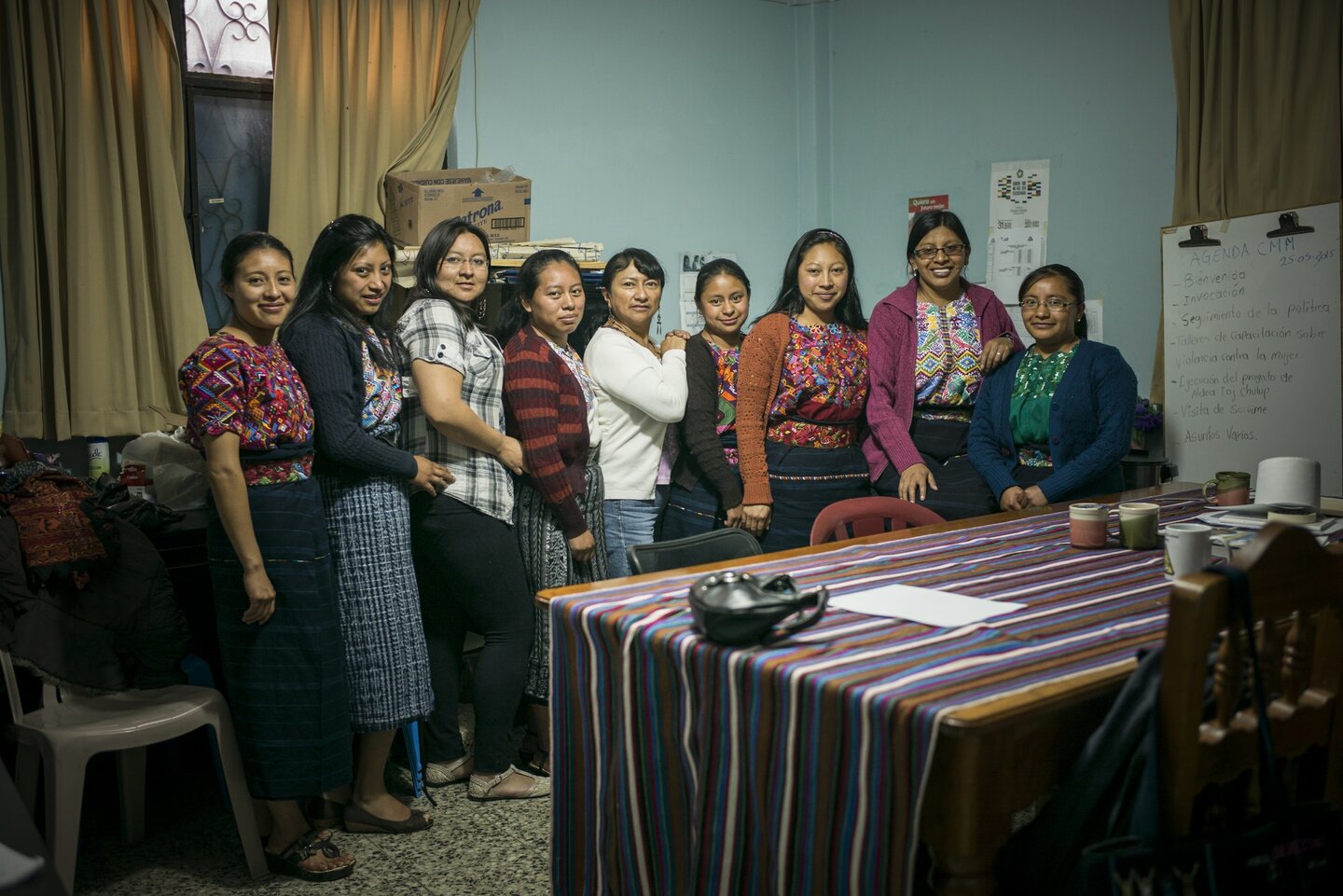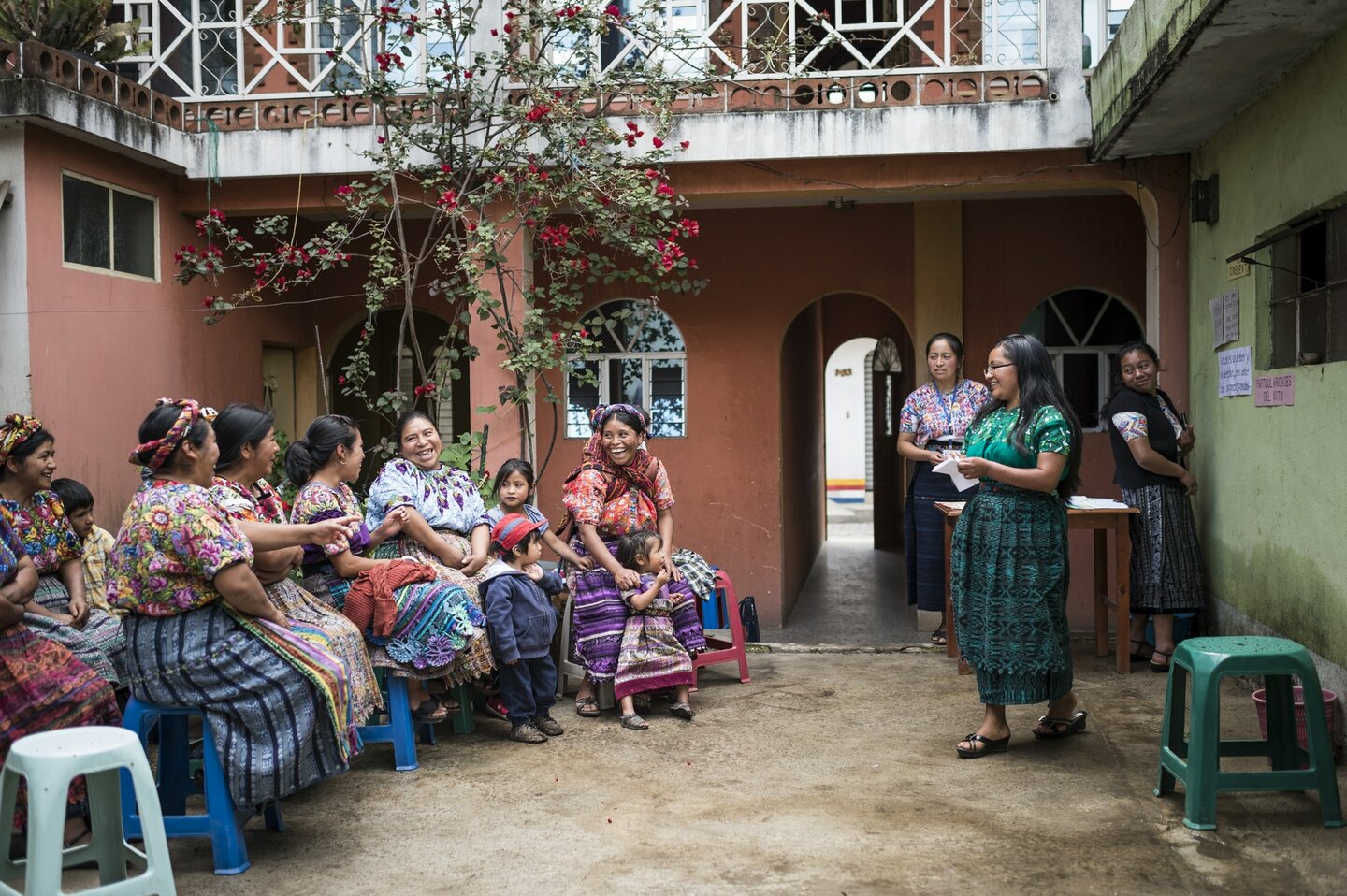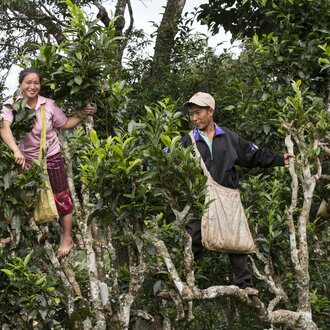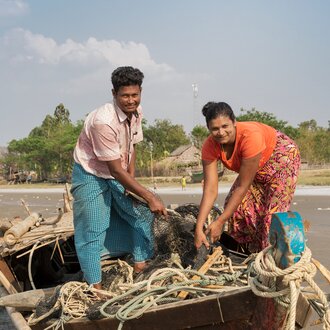Irma was horrified upon entering the room the municipality had allotted her for the creation of a Gender Equality Office. It was a dark damp room on the ground floor, coldly lit by an energy-saving bulb dangling from the ceiling. That’s all there was: no table, no chair, no typewriter, let alone a computer. “There was just this empty room,” says Irma. That symbolized to her how little a Gender Equality Office meant to the community. Or, on a somewhat more positive note, how helpless the local authorities are when it comes to meeting gender equality goals.

Local authorities overwhelmed
The local authorities of Concepción Chiquirichapa were overwhelmed by the government’s decentralization scheme, which gave them more responsibility in planning their own streets and water supplies, schools, healthcare and social services. They had no prior experience in planning projects clearly from start to finish, drawing up budgets and applications for funds. Furthermore, they were used to treating their citizens not as partners, but as subordinate supplicants.
In our Servime project, Helvetas trains local decision-makers in transparent and efficient approaches to problem-solving. This is key to the country’s future, for it also serves to build up people’s trust in the authorities and in politics in general.
Concepción Chiquirichapa is a community of 20,000 people living either in the main town or one of its many outlying villages. A great deal of Mayan culture has been preserved here in the western highlands of Guatemala: their way of farming, their language, the women’s traditional dress. And yet behind this picturesque façade, many families are falling apart because the fathers have emigrated to the United States. Teenage pregnancy is rampant, so are alcoholism and domestic violence. Girls drop out of school earlier and more often than boys, and there are hardly any women at all in political decision-making bodies. Even as a child, Irma Dolores Hernández, who was raised in a big family with traditional values, refused to accept the notion that women are inferior to men. At the age of 13, she helped start up a local youth club. She also worked as a volunteer for Habitat, an aid organization that helps build decent and healthy housing. She founded an association for weavers, where she taught cooking and sewing to local women. Although she never even attended secondary school, she became a well-known member of the community in Concepción.
Irma Dolores Hernández, director of the Gender Equality Office
Giving women a say
When the municipality was looking for a director of the Gender Equality Office, Irma applied and, much to her surprise, got the job. She was a tenacious 36-year-old who’d set herself one main goal: to bolster women’s skills and self-confidence and give all the marginalised – women, young people, indigenous peoples – a say in Guatemala. They should all learn to speak their mind publicly and assert themselves in the face of derision and antagonism displayed by men, by their elders and the powers that be.
These are precisely the objects of the Helvetas project. In her Helvetas classes, Irma learned how to organize and obtain funding for the Gender Equality Office. Her office is now furnished and up and running, with a budget for her activities. In the morning she counsels women who come to consult her about their problems. Alcoholism, violence, sexual harassment and rape. Infidelity and divorce. In the afternoon she pays visits to the outlying villages, where she talks about domestic violence, parenting and women’s largely untapped capabilities. She encourages everyone to actively take part in assemblies and organizes workshops on overcoming anxieties and public speaking.
Irma lost those anxieties a long time ago. Today, she has no problem standing up to the established politicians and make a clear-cut case for the rights of women and the marginalised. Irma is familiar with the administrative rules and highly intricate relations within the community. Could she imagine running for mayor? “Not now,” she says. “It’s too early, I have to prepare myself better politically. I demand more of myself than of others,” she adds, locking the door to the office behind her as we walk out into the brightness of the marketplace. It may be Corpus Christi, one of the high holidays in the Catholic calendar, but people are buying and selling as if it were just another market day. It smells of fried meat and corncobs. Some half-drunk young men are heckling some young women, who in turn are making fun of them. A picture made of coloured sawdust with which some old men had bestrewn the street this morning for Corpus Christi has become smudged and unrecognizable.
Backyard civics training
We walk past the church and into one of the little lanes, knock on a door and enter a backyard, where Flora, Olga and Susanne are going to explain the upcoming elections to a group of women. In the yard are some chairs, a large rack of germinating seed potatoes and containers and tools of all sorts, some still usable, some not.
The three young women are prepared for class: they’ve drawn up a list of make-believe parties and hung up some fictitious election posters, which do not feature any slogans of strength and unity, any party symbols or politicians’ faces, but some well-known cartoon characters – a rattlesnake, lion, pig, plus the cat from the Smurfs’ village – which are not intended as sarcastic commentary on the elections.
Firecrackers, which accompany every holiday around here, can be heard going off outside. When someone knocks on the door leading out to the lane, the loud metallic clanking sounds peremptory and off-putting. It must have sounded just like that back in the 1980s when the reigning dictator, General Rios Montt, and his army waged a ruthless war against the indigenous population of Guatemala, and people would jump with fright at every pop and bang in the street, every loud knock at the door. Montt’s war was marked by a vicious and deep-seated contempt for the Maya, Garífuna, Xinca and all the other indigenous peoples of Guatemala. A contempt displayed even to this day by Latin American societies in general ever since the Spanish Conquista.

That contempt seems far, far away from this backyard gathering in Concepción Chiquirichapa. Olga, Susanne and Flora stand there self-assured and smiling before the assembled women, some of them as old as their mothers. “We have rights,” says Flora. “We have the right to free speech and assembly.” The women nod in agreement. “We have the right to go to the local authorities and demand clean drinking water,” she continues. “We have the right to send our children to school. And we have the right to vote.” Her voice is firm. Her listeners nod again as her words hit home. “I used to be shy, very shy,” Flora later recounts. In school she was terrified that the teacher might call her to the board and have her explain something to her classmates. “I’d break out in a sweat, sometimes I cried,” she recalls.
Flora Beatriz Cabrera Lorenzo, activist and teacher in adult education
Thinking for yourself is a duty
Flora Beatriz Cabrera Lorenzo grew up in a large peasant family. They had no money for their children to go to college, so early on she had to give up on her dream of studying psychiatry. Her father felt that primary school was enough for the girls. With the support of her tenacious and self-confident mother, she at least got a chance to train for the humble position of primary school teacher, and thanks to Helvetas courses she is now employed by the municipality as a teacher in adult education.
Flora admires Irma, who has become a teacher and mentor to a new generation of young women. “My friends and I were able to go through the doors Irma opened for us,” says Flora. Now 22 years old, she is trying to open some doors herself for other women, too, in a backyard in Concepción Chiquirichapa. “We waste our time watching telenovelas, it’d be good for us to switch to the news sometimes,” she tells the women. You have to be well-informed to vote, she explains. There’s no point in voting unless you think things through: “Thinking for yourself is a duty – which we owe to our people, too,” she concludes.
What Flora doesn’t mention here is the underlying doubts that sometimes haunt her. Guatemala isn’t doing well. Crime is rampant. Drugs. Kidnappings. Robberies. The homicide rate is one of the highest in the world, while the detection rate for violent crimes is near nil. More and more people are taking the law into their hands, there are more and more reported lynchings of alleged criminals. Many turn that despair against themselves, too. In Concepción Chiquirichapa alone, Irma points out, six people killed themselves last year. Girls who got pregnant much too young. Men and women who collapsed under the weight of debts. Teenagers who couldn’t find a way out of the stiflingly close confines of their parental homes.

Stepping out from under a shadow
And there’s no prospect of improvement in sight. Most of the contenders in this year’s national elections were out to maximize their own access to government funding. Government contracts are not awarded to the best tenders, but to a cabinet member’s or a mayor’s cronies. “All I see is politicians looking out for their own self-interest,” sighs Flora. She wants to do it differently and get out from under the shadow which society casts on women from poor families. A few weeks ago, she announced at home that she was planning to go into local politics. That was on a night in June. The women and girls were seated around the stove for dinner, her father sat at the table all alone.
“I want to get elected to our village development committee,” Flora announced in the silence of the kitchen. “You mean women are to run the village?” her father snapped sardonically. “Why shouldn’t us women be capable of that?” she retorted. “Don’t we have a brain to think with?” “If the men are already failing, how are the women to manage it?” he insisted. “We have the same rights you do,” Flora snapped back, angry at her father for his reactionary views. Flora is one of the many women who are experiencing in their immediate surroundings and in their own lives what is ailing the country as a whole. She feels the resignation in everyone’s political comments and hears first-hand accounts of how venal and unreliable the powers that be are in Guatemala. And she is a victim of the machismo that is part of everyday life there. As a girl she was outraged when her neighbour mistreated his wife; as a young woman she has learned in her Helvetas training to transform this outrage into action. “Autoestima” was the most important word she took home from her first class. Self-esteem. Self-respect. A sense of having some ability – and being able to use it.








